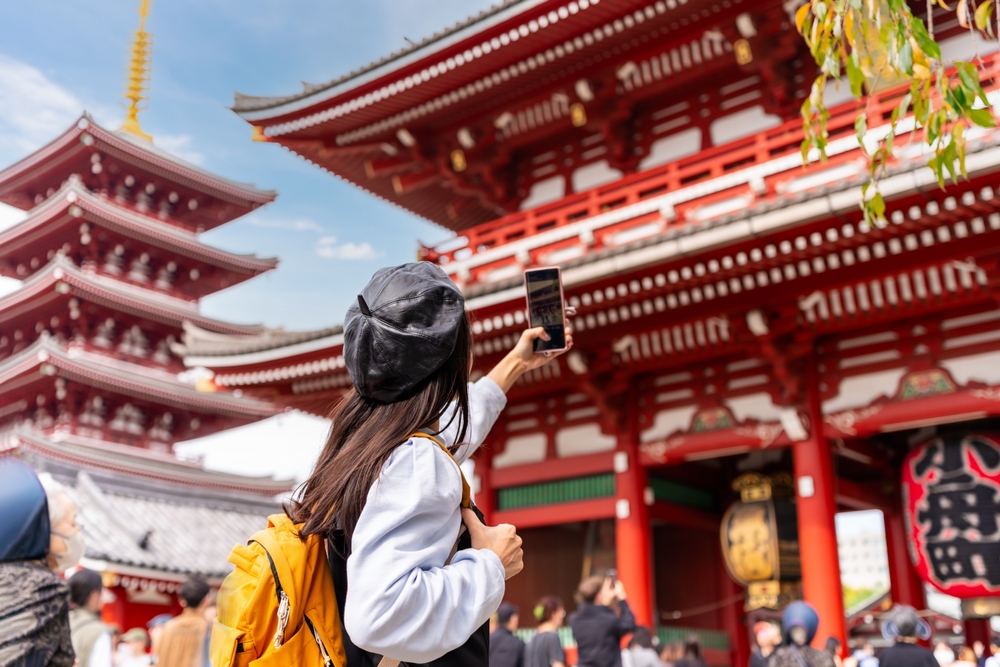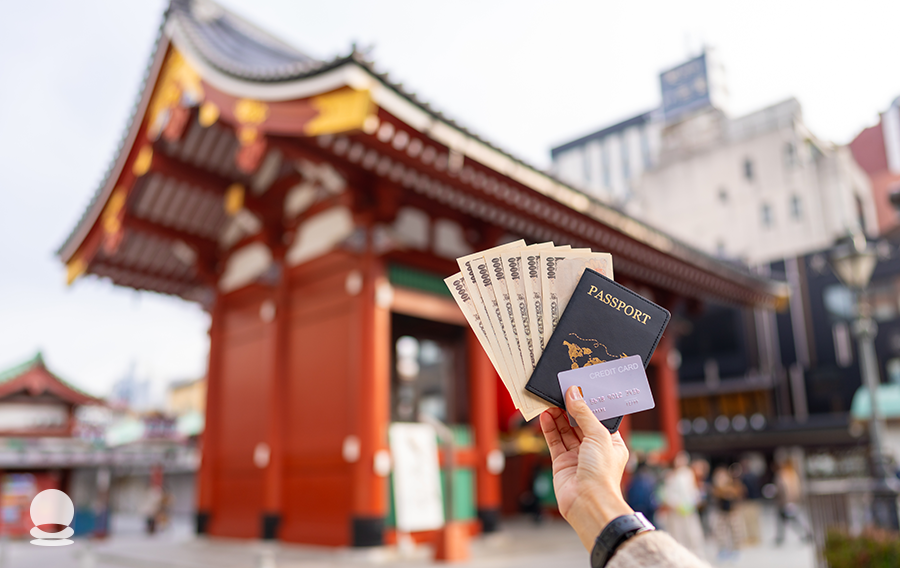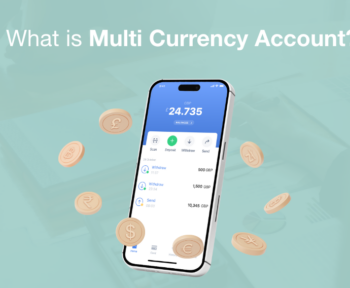Planning a trip to Japan? Successful travel to foreign destinations requires travelers to maintain financial organization. But do not worry! Jeton’s Japan Travel Money Guide is here for you! Japan remains a top global travel destination due to its incredible cultural attractions and beautiful landscapes along with its major cities.
When planning a trip to Japan for tourism or business purposes you must consider how you will manage your finances while traveling. Your travel experience can be greatly affected by the way you manage money from learning about the local currency to choosing your funding access methods.
Those who do not know about Japan travel money initially find Japan’s payment systems confusing. That is where Jeton comes in. Jeton provides travelers to Japan with secure digital wallet options that support over 40 currencies including JPY and feature built-in crypto trading capabilities.
Japan Travel Money Guide presents valuable information about different payment methods available in Japan and how to handle transactions in Japan travel money. Additionally, understanding the cost of travel in Japan helps you prepare a realistic budget, including expenses for Japan money exchange options. Let’s start to explore!
Japan Currency
Yen banknotes are issued in 1000, 2000, 5000 and 10,000 yen values while Japanese coins exist in 1, 5, 10, 50, 100 and 500 yen denominations. Preparing yourself by learning about the Japanese yen denominations before traveling will make your trip smoother. The yen symbol looks like this: ¥, and you may see prices written with the symbol placed before the number, such as ¥100.
Getting Yen: Before or After You Arrive?
An essential early travel choice involves deciding to exchange money for yen before you fly to Japan or wait until you arrive to withdraw it. Exchanging money at home helps you avoid airport lines but you might find better exchange rates available once you reach Japan. Airport exchange locations usually charge higher transaction fees.
It is advisable to wait until your arrival to get better exchange rates if your travel date is several weeks away. Maintaining a reserve of emergency cash helps to manage unexpected delays or ATM withdrawal problems after enduring a lengthy flight. Upon arrival at the airport, withdraw a small amount of yen through an ATM and then continue exchanging cash throughout your trip to achieve better rates.
Is It Better to Pay in Yen or USD?
Major credit and debit cards work at most large Japanese businesses and retailers but cash transactions remain dominant for minor purchases. Local transportation fees, food stalls, shops, and other daily expenses require currency in Japan — yen — for payment.
Despite the preference for yen payments at most locations in Japan, some national chains along with restaurants and convenience stores might allow you to pay with US dollars so you should consider asking.
Using Japanese yen (JPY) for payments helps customers avoid the poor exchange rates merchants often apply to US dollar transactions. You’ll find it easier to pay because small stores often lack sufficient change for big bills. Ensure that your wallet contains a minimum of 5000-10000 yen each day to cover small expenses such as food items and transportation costs.
Using Cards and Cash in Japan
Credit cards work at larger stores yet cash continues to dominate smaller transactions in Japan. You should always keep both cards and cash on hand throughout your trip. ATMs affiliated with post offices and 7-Eleven locations allow fee-free cash withdrawals with debit cards from networks such as Plus or Cirrus. Keep in mind that cash withdrawal limits generally stand at 100,000 yen each day.
Visa and Mastercard credit cards receive acceptance from mid-sized retailers and organizations of larger size. Smaller stores along with food stalls and convenience stores often only accept cash payments.
The use of cards is ideal for making significant purchases whereas cash offers better flexibility when dealing with routine expenses. Contactless payments gain popularity and stores often display a contactless symbol to indicate availability. Digital payment services such as Jeton offer enhanced security together with convenient transaction methods.
Jeton enables you to securely keep your money in different currencies while you make online payments or conduct international money transfers. You can withdraw cash from numerous ATMs across Japan using their prepaid Mastercard at minimal fees with Jeton. This service offers a convenient backup payment method in addition to your native currency.
If you want to learn more you can check our useful guides:
You can also follow Jeton Blog for more information!

Is It Better to Exchange Cash or Withdraw from an ATM in Japan?
Many travelers ask about the best option between exchanging money before a trip to Japan or using ATMs during their stay there. Both exchange currency before travel and ATM withdrawals have their own advantages and drawbacks.
- Using cash exchanged before your trip prevents you from encountering the higher rates found at airport currency exchanges. Daily fluctuations in exchange rates mean you could receive a lower rate when exchanging cash compared to using an ATM in Japan.
- A foreign debit card usage at post office or 7-Eleven ATMs leads to a transaction charge of approximately 200-300 yen. Your bank’s ATM fees for overseas withdrawals range between $3 to $5 per transaction.
- The optimal exchange rates are typically available at large banking institutions and major post offices. Currency exchange counters operate during restricted hours that may not match your travel timetable.
You should carry some emergency cash from home and then withdraw more money from ATMs when you arrive to benefit from the best rates and convenience. Jeton provides access to thousands of ATMs where users can withdraw cash with minimal fees.
Monitoring exchange rate trends is also a useful travel money tip to help you capture favorable periods for money exchange Japan. Using multiple financial methods allows you to maintain flexibility wherever you travel.
How to Avoid ATM Fees in Japan?
Maximizing the value of your travel money requires avoiding ATM fees. Here are some tips:
- Withdraw cash from domestic banks by utilizing ATMs at post offices and 7-Eleven locations. The flat fee for using them stands at 200-300 yen.
- To maximize your financial flexibility when abroad use a credit card that doesn’t charge foreign transaction fees and pay off the balance in full each month to avoid interest charges.
- Make use of Jeton’s prepaid Mastercard to manage your travel money Japan without incurring extra ATM fees.
- Inform your bank about your travel plans to prevent them from marking international ATM withdrawals as fraudulent.
- Reduce transaction fees by withdrawing larger amounts of money less often.
- Through strategic planning and choosing preferred ATM networks you can eliminate extra fees. Jeton offers travelers a comprehensive solution that enables secure access to funds without any associated ATM fees.
Effective financial management remains essential for travelers going on international trips. You can conserve both time and money during your Japanese travels by mastering the local currency and learning efficient cash access methods along with optimized payment techniques.
Jeton’s flexible payment solutions make it a top choice for both business travelers and casual tourists who need secure payment handling while traveling. Mastercard digital wallet service offers integrated crypto features to fulfill various payment requirements.
Use the Jeton app to begin making easy money transfers and payments and withdrawing cash from ATMs globally while paying minimal fees. You can easily download Jeton via Google Play Store or App Store according to your smartphone!
How Much Things Cost in Japan
Travelers planning a trip to Japan should familiarize themselves with both living expenses and regular costs within the country. Touring large Japanese metropolises like Tokyo results in considerable travel costs for visitors.
Despite high expenses visitors pay in Japan they find the country affordable because of superior life quality standards and service quality. The average cost breakdown shows how far your travel budget will let you go.
- Accommodation: The price for standard hotel rooms in major cities typically falls between $100 and $300 per night. Budget hotels and hostels are around $30-80.
- Food: Prices at convenience stores and fast-food restaurants typically cost between $6 and $12. Sit-down meals at casual restaurants are $12-25. Fine dining starts at $30+.
- Transportation: A single one-way JR train ticket between cities costs between $5 and $15 depending on the travel distance. Airport limousine buses cost $15-30. When taking taxis for short city rides passengers usually pay between $10 and $15.
- Attractions: Most popular museums and shrines require admission fees that range from $5 to $15 for visitors. Theme parks range from $30-75.
- Shopping: Shopping for souvenirs and snacks together with clothing and electronics offers affordable purchasing options. Gifts and accessories are typically priced within the $10 to $30 range.
Living expenses in Japan match the monetary requirements of prominent cities in Western nations. Jeton users gain the ability to convert their home currency into Japanese yen (JPY) at advantageous rates for secure spending. This service that demands upfront payments, supports online bookings for hotel stays and tourist attractions.
Money Etiquette in Japan: Things to Know
Anyone who wants to successfully engage with Japanese society needs to understand Japanese cultural norms and money etiquette. These fundamental tips enable you to comprehend and move through Japanese financial customs with greater ease.
- Cash is king in Japan. The majority of Japan’s stores, restaurants and vending machines only operate on cash transactions. You need to bring sufficient small denomination currency for daily transactions to ensure smooth financial exchanges.
- The social conventions in Japan make tipping unnecessary for restaurant services and professional interactions. Employees value when customers round up their payment but this action remains optional.
- Techo receipts serve as essential documents for recording financial transactions and managing records. Maintaining better control over your finances requires you to obtain receipts whenever possible.
- Use respectful manners and maintain your patience when conducting monetary transactions with clerks. When you interact with others show respect with a slight bow and use sumimasen as a polite way to say excuse me.
- The Jeton prepaid card lets you purchase items and withdraw cash from ATMs without needing to carry substantial amounts of cash. Make sure to transfer funds to your digital wallet whenever you need money.
- You must keep your passport close during large transactions because it serves as required identification. Both electronics shops and car rental services demand that customers present valid identification for expensive purchases.
Understanding Japanese cultural customs helps facilitate seamless payment exchanges. Jeton allows users to exchange currency before their trips to spend money exchange Japan and cost of travel in Japan according to local customs.

Tips to Save Money While Traveling
You will find your travel budget expands when you understand Japan’s standard costs and proper conduct by following these additional tips.
- The JR Pass becomes the preferred option for travelers who need to travel between major cities on bullet trains. It offers great value over individual tickets.
- Visitors to rural areas should choose ryokan accommodations to experience the traditional Japanese inn setting. Staying overnight at the hot springs becomes a sensible spending decision because of its reasonable price.
- You can purchase a prepaid SIM card or E-Sim to enable call functionality and Wi-Fi data access on your mobile device. The prepaid SIM card offers savings over the roaming charges from your regular mobile provider.
- Bicycle rentals present a budget-friendly method for visitors to discover neighborhoods and small towns without using public transportation.
- Japanese shrines and temples offer visitors free exploration opportunities of traditional Japanese culture and architecture without requiring admission fees.
- Enjoy scenic park views while minimizing costs by packing meals from local convenience stores.
- You can purchase your souvenirs and snacks along with your everyday essentials at discounted prices from stores such as Don Quijote. Bargain hunting can save quite a bit!
The Jeton app allows users to manage their budget in real time by tracking expenses easily and setting adaptable spending limits. Full exploration of Japan enables better management of your travel funds.
Planning Your Daily Budget
Maximize your travel budget by establishing a daily spending plan which includes accommodations expenses, food costs, transportation fees and activity charges. Keep your budget spending in check by using conservative cost estimates. This Jeton template will organize your daily expenditures.
- Accommodation: $80 (hostel dorm bed for 2 nights)
- Breakfast: $6 (convenience store bento)
- Lunch: $10 (noodle shop meal)
- Dinner: $15 (casual restaurant dinner)
- Snacks/Drinks: $5 (vending machine refills)
- Transport: $10 (train tickets within city)
- Attractions: $15 (museum entry)
- Total Daily Cost: $141
The Jeton card sets daily spending limitations at $150 but still allows users to maintain flexible budgeting. Review your budget every evening to pinpoint potential savings for the next day. Continuous practice will enhance your skill in estimating location-specific costs. Proper financial management helps you maintain your travel funds throughout your entire stay in Japan.
Avoiding Money Scams
You should stay alert to financial scams when visiting Japan during international travel. Here are a few common ones:
- Examine large bills thoroughly upon receipt and report any unusual observations to local authorities. Avoid exchanging money on the street.
- Ensure that taxi meters are accurate and check receipts for hidden charges on meals that you didn’t eat.
- Approach strangers who offer help when you lose your wallet with caution because they might have hidden intentions. Ensure your valuables stay protected by keeping them secure.
- Avoid phone and email scams where criminals impersonate banking institutions or officials to steal your personal information or money. Legitimate organizations will not make initial contact through unexpected communication methods.
Wrapping Up
Start using your Jeton account today to move funds through authorized payment methods before exploring Japan’s attractions. The intuitive interface enables sending money to family members abroad while allowing you to spend locally using the Jeton Card and buy popular cryptocurrencies among additional possibilities.
Jeton enables users to discover Japan’s rich cultural and natural wonders by experiencing its food and traditions. If you implement these travel money tips, you will be able to make your travel money Japan, go further and create unforgettable memories.
Ready to explore Japan stress-free? Make your journey smoother by opening a Jeton account today. Enjoy fast, secure, and globally accepted payments—perfect for booking transport, shopping, dining, and more while you’re in Japan. Do not wait until you land—get Jeton now and travel smart!


